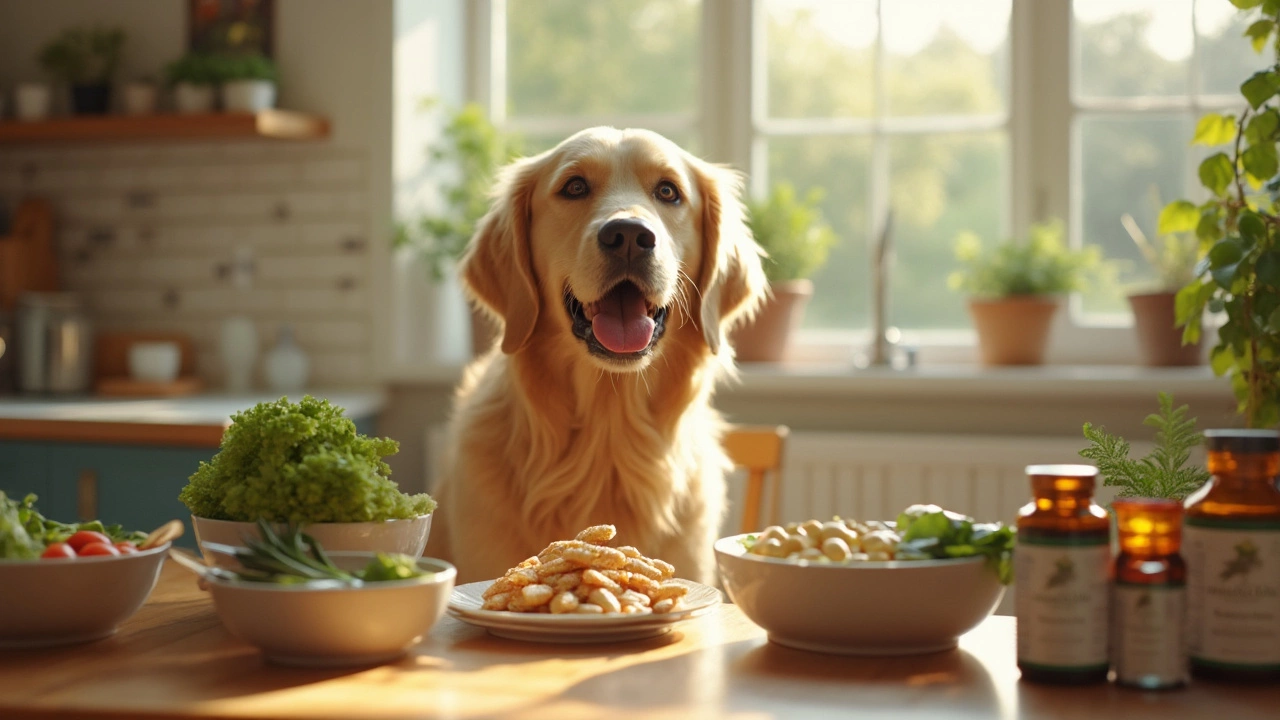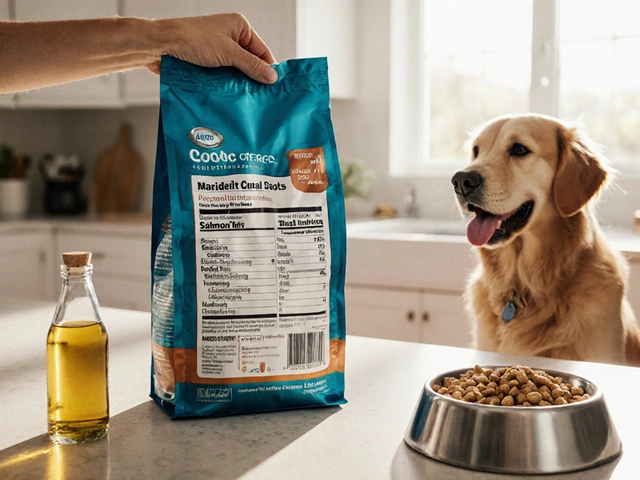Ever watch your dog wolf down a bland chunk of food and wonder if all their needs are really covered? We’re told 'complete and balanced' dog foods exist, but what does that even mean to a wriggly 80-pound lump of fur (or a 6-pound ball of attitude)? I remember when my son, Gideon, asked me if dogs need their flintstone chewables like he does—honestly, not a bad question. So, if you want your dog to grow old, happy, and with fewer vet bills, figuring out what vitamins they really need makes a ton of sense.
Why Vitamins Matter for Dogs
Your dog’s body is a wild blend of muscles, bones, nerves, and mysterious things like 'mitochondria.' Vitamins run the whole show behind the scenes. Without the right ones, your dog's fur starts looking patchy, their digestion goes from hero to zero, and you might notice odd habits like gnawing at paws. Here’s the kicker: Dogs need 13 vitamins deemed “essential.” That list includes vitamin A (think immunity and vision), most B vitamins (for nerves, energy, and a healthy gut), vitamins C and E (because antioxidants aren’t just for Instagram), vitamin D (bones), and Vitamin K (clotting—important when they inevitably get that mystery scrape).
Imagine this: One study from Cornell’s vet school found that dogs eating homemade diets without proper supplements often developed deficiencies in B vitamins, calcium, and Vitamin D within just six months. Dogs aren’t small, fuzzy humans—some vitamins, like vitamin C, they make themselves, while others, like D, are super tricky in dog foods. Critical fact alert: Too much of some vitamins, like vitamin D or A, can do more harm than not enough, causing everything from weak bones to real organ problems.
But let’s keep things down to earth—most commercially available dog foods labeled “complete and balanced” must meet standards set by the Association of American Feed Control Officials (AAFCO). That means, on paper, your pup isn’t missing out. But, if your dog only eats home-cooked meals, raw food, or has medical issues, vitamins can become a real conversation with your vet.
| Vitamin | Main Benefit | Deficiency Risks |
|---|---|---|
| Vitamin A | Vision, Immunity, Skin | Night blindness, poor coat |
| Vitamin D | Bone Growth | Weak bones, rickets |
| Vitamin E | Antioxidant, Skin | Muscle weakness, fertility issues |
| Vitamin K | Blood Clotting | Bleeding problems |
| B Vitamins | Metabolism, Nerve Function | Bad appetite, poor growth |
| Vitamin C | Antioxidant | Rarely deficient |
Finally, a real-world tip: The food label matters. If your dog’s food says it meets AAFCO guidelines for your dog’s life stage and they’re healthy, you likely don’t need to toss extra vitamin pills in their bowl. Exceptions? Senior dogs, pregnant or lactating females, puppies, or pups with chronic diseases. Yup, a one-size-fits-all only works for socks.
The Core Daily Vitamins Your Dog Needs
If you wake up thinking: "Is my dog getting the vitamins he actually needs?" there's a quick checklist that covers most healthy adult dogs, with some exceptions depending on breed or health problems. Here are the vitamins every dog should get daily as part of their diet, either from food or, if recommended, supplements:
- Vitamin A – Not just for Superman sight—dogs need it for skin, growth, and immune function. You’ll find it in liver, eggs, fish oil, and carrots (but in the right, dog-friendly form—leave the juicers to humans).
- B Vitamins (B1-Thiamine, B2-Riboflavin, B3-Niacin, B5-Pantothenic Acid, B6, B7-Biotin, B9-Folate, B12) – This family does heavy lifting with metabolism, energy, nervous system, and even skin health. Fish, liver, leafy greens and eggs all make good sources.
- Vitamin D – Dogs can’t just sunbathe their way to strong bones like us. They need this from food, especially fatty fish and fortified ingredients.
- Vitamin E – It’s the bodyguard of cells, fighting off free radicals. Look for it in seed oils or supplements.
- Vitamin K – Super important for blood clotting. The good news? Gut bacteria usually make enough, but it needs to be on board, especially for dogs on some medications or eating weird stuff (hello, garbage day).
- Vitamin C – Dogs make some of their own, but if they’re under stress or sick, they might need a little boost. Not usually supplemented in healthy dogs, but still gets talked about.
Listen, it’s not just about more = better. For instance: Vitamin D toxicity is a growing issue, thanks to people giving too much fish oil or human supplements. Symptoms? Vomiting, loss of appetite, drinking and peeing more, and, at high levels, kidney damage. Your dog’s best bet: get these vitamins from good dog food, not a fistful of pills.
Medically proven tip: Always check with your vet before you start any vitamin supplement. Dogs with chronic diseases like pancreatitis or malabsorption issues may actually need extra, but healthy dogs often do fine with food alone. Gideon once tried to sneak his gummy vitamins into our dog’s food bowl. Cute idea—terrible move. Human vitamins can contain iron and other additives that are toxic to dogs.

When Supplements are Necessary
So, what about all those chewable or bacon-flavored supplements lining the pet store aisle? Here’s how to tell if your dog might benefit from actual vitamin supplements—not just marketing:
- Your dog eats a home-cooked, raw, or unconventional diet. Most homemade meals (unless guided by a certified veterinary nutritionist) miss some critical vitamins and minerals, especially calcium, vitamin D, and certain B-vitamins.
- Your dog has health issues like chronic diarrhea, pancreatitis, exocrine pancreatic insufficiency, or food allergies. These dogs sometimes can’t absorb or process nutrients effectively.
- Your dog is a pregnant, lactating, or working animal (think sled dogs, police dogs, or Agility champs). They burn through vitamins like kids at a candy stand.
- Specific breed or size needs—giant breeds, for example, often need more careful balance of vitamin D and minerals to grow at a healthy pace.
- Your vet notices poor coat quality, weight loss, odd behaviors, or slow healing—all could flag a hidden deficiency, and blood tests might confirm it.
Your veterinarian can prescribe or recommend a supplement tailored to your dog’s health, age, and lifestyle. The best ones? Look for brands that have earned the National Animal Supplement Council (NASC) Quality Seal. Cheap, random Amazon finds? They may contain too much or too little of the active ingredient, or even dangerous fillers.
Quick story: A friend of mine tried to balance his dog’s homemade chicken-and-rice dinners by adding a multivitamin meant for senior citizens. Six months later, he ended up at the emergency vet. Turns out, the supplement included way too much vitamin D. The dog recovered, but not before a $900 bill. Save yourself the headache: supplements, yes, but only if needed, and always with a vet’s green light.
| Scenario | Supplement Needed? |
|---|---|
| Commercial complete food, healthy dog | No |
| Homemade diet without vet guidance | Yes |
| Chronic digestive illness | Maybe, ask vet |
| Puppy, senior, or breeding dog | Sometimes, guided by vet |
| Skin/coat issues | Maybe, if diagnosed |
Tips for Choosing and Giving Dog Vitamins Daily
Giving your dog vitamins isn’t hard, but you do want to be sure you’re doing it right. These are the points you have to keep in mind before reaching for that supplement bottle:
- Check the label. Look for supplements specifically formulated for dogs and avoid those meant for humans, since even small differences in formulation can be dangerous.
- Go with trusted brands. Look for those with transparent ingredient lists and, much more importantly, actual testing data (NASC seal means something).
- Dosage matters. Too much vitamin D, calcium, or even E can be fatal to dogs. Always stick to dosing guidelines and never 'eyeball it.'
- If you are switching foods, especially among boutique, raw, or fresh foods, consult a vet about whether additional vitamins or minerals are needed.
- Know the signs of “too much” and “not enough.” For example, dull coat, digestive upset, or even behavioral changes can be linked to vitamin imbalance. On the flip side, vomiting, excessive thirst, or kidney problems sometimes signal too much supplementation.
There's no one-size-fits-all vitamin regimen. Some dogs thrive on high-quality dry food, others need occasional boosts—for example, older dogs given vitamin E and C have shown, in Texas A&M research, to experience fewer age-related cognitive declines compared to those on standard diets. Still, too much enthusiasm for supplements can land your pet in the ER.
A couple of pro tips to wrap this up: Mix supplements into your dog’s food if they’re chews or powders—most dogs won’t notice, and this helps with absorption. For picky eaters or those needing precise dosing (say, vitamin B12 injections for chronic stomach issues), follow your vet’s advice to the letter. Keep supplements in their original container, away from heat and moisture, and never let your dog chomp indiscriminately on bottles. Last thing you need is them pulling a Gideon and deciding vitamins are candy.
To recap? High-quality dog food usually covers most daily vitamin needs, but some dogs—because of diet, age, or health—might need more. When in doubt, talk to your vet, know your labels, and go easy on the extras. Dog health isn’t about making a nutritionist out of every pet owner, but it is about paying attention. Give your dog the building blocks for a healthy life, and you might just save yourself a bundle in vet bills—and maybe even buy your pup a few more happy years chasing Gideon's soccer ball around the backyard.







